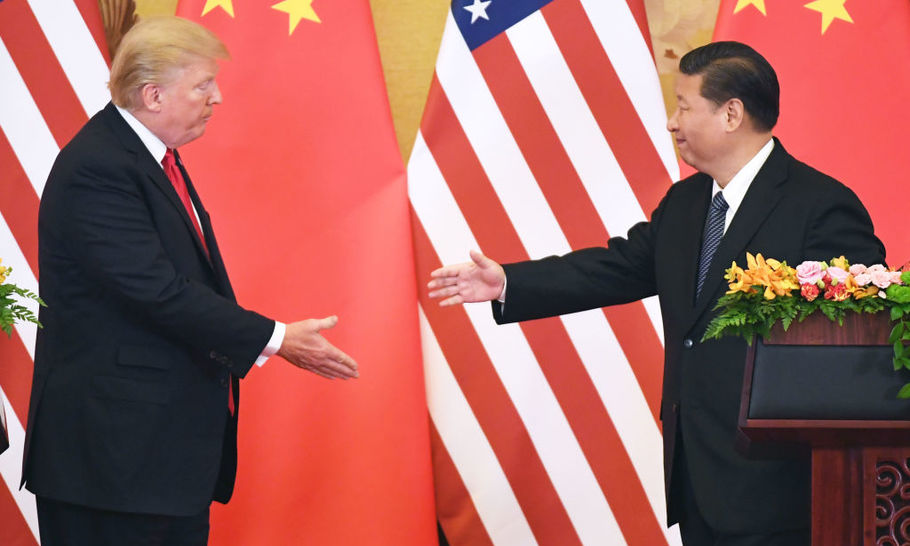The US-China trade deal has changed nothing at all

Donald Trump and Xi Jinping (Kyodo News Stills via Getty)
After almost two years of haggling and argument, with moments of high drama, the US and China announced a first phase deal for a trade agreement on January 15. The dry, technical language of the communiqué itself did not deter either President Donald Trump or Xi Jinping heralding the ground-breaking nature of the deal for their respective countries.
In terms of symbolism, this event is significant. It comes at a key time for both leaders. Trump is facing domestic woes, from an impeachment hearing in the Senate, to an election battle looming through the rest of the year till November. For him, it makes sense to at least have something tangible on the table to show that his hardball tactics with the People’s Republic have worked.
For Xi, despite not having to face any kind of election, and looking secure in power, the lowest growth figures for 30 years announced at the end of 2019 offer a different kind of pressure. He too needs something to show to his domestic, and very nationalist, constituency — and at least clearing some of the issues with the US out of the way makes sense.
Xi’s statement said this was a good deal for the two parties involved, and for the world. This is true inasmuch as fights between players as mighty as the world’s largest and second largest economy risk creating too much pain all round. But before getting too excited, we have to recognise the limitations of the January 15 deal, and what it leaves for another day — one that may never come.
The highly contentious issues of intellectual property protection, and of asking companies to observe prohibitive technology-sharing regulations in China are covered in detail. Liu He, Xi’s key negotiator and the main economic advisor, applauded the “spirit” of the agreement.
But it is precisely how to interpret “spirit”, beyond the letter of the law, that has been one of the biggest issues between the two sides. It haunts their disagreements about protocols around World Trade Organisation implementation from 2001, and a rash of other issues where they both thought they had signed up to one thing, and then found they fundamentally disagreed, not on the words used, but the meanings imputed to these.
The brute fact is that the subsidies the Chinese government has been dispensing to companies will not be affected by the trade agreement, despite this being one of the greatest problems not just for the US, but also for the EU and others. That is because, lurking behind this is the infrastructure of state control over business. Xi Jinping will not, and in fact, could not, allow this to be attacked, for the very simple reason that these are so politically important for his administration, and for the Communist Party’s secure hold on power in the country. Beijing is as likely to relinquish this as Washington is to give up free market economics.
Trump, the great deal-maker, also preserved his own red line — tariffs. He said he wanted something left to negotiate over in future deals. The impact of tariffs on one issue in particular is important for him, and has been for decades, long before he became a politician. This is the immense trade imbalance between the two countries. China has agreed to go on a spending spree, and try to do something to rectify this, buying new equipment and agricultural produce.
Economists have argued about just how meaningful this trade surplus is. What is clear is that politically, it means a lot to Trump, and to his supporters, even if it leads to zero real outcome in terms of the overall economy. We can expect this to figure in the future, if he is re-elected. Round two will be dependent on just how much China has managed to splash out on US goods, services and produce.
In the short term, Xi may well have compromised. But phase one indicates that the deep structural issues have remained in place. The US is, and will continue to be, antagonistic and resistant to a world where China continues its rise to number one in terms of economic size. Nothing at the moment looks likely to disrupt this, despite the country’s slowing economic growth. It is just a matter of time. Nor has the scale of China’s ambitions, and their problematic impact on the world, disappeared. A fifth of humanity, with their aspirations and demands, is not going to vanish. Those in the US hoping for this, in and out of the administration, can dream on.
The events in mid-January between China and the US can best be seen as preludes to the prelude to the first part of the first act. The main play will continue, with a dynamic and a plot that this agreement will not fundamentally alter. Indeed, there is a question over whether there is anything the US, or anyone else can do, including China, to change this plot. The bottom line is that some time in the next decade, deals or no deals, the world’s largest practitioner of capitalism will be a Communist one-party state. All the January agreement means is that the day this happens might be a few days later than it was before the US and China started their fight. Beyond that, nothing has changed.




